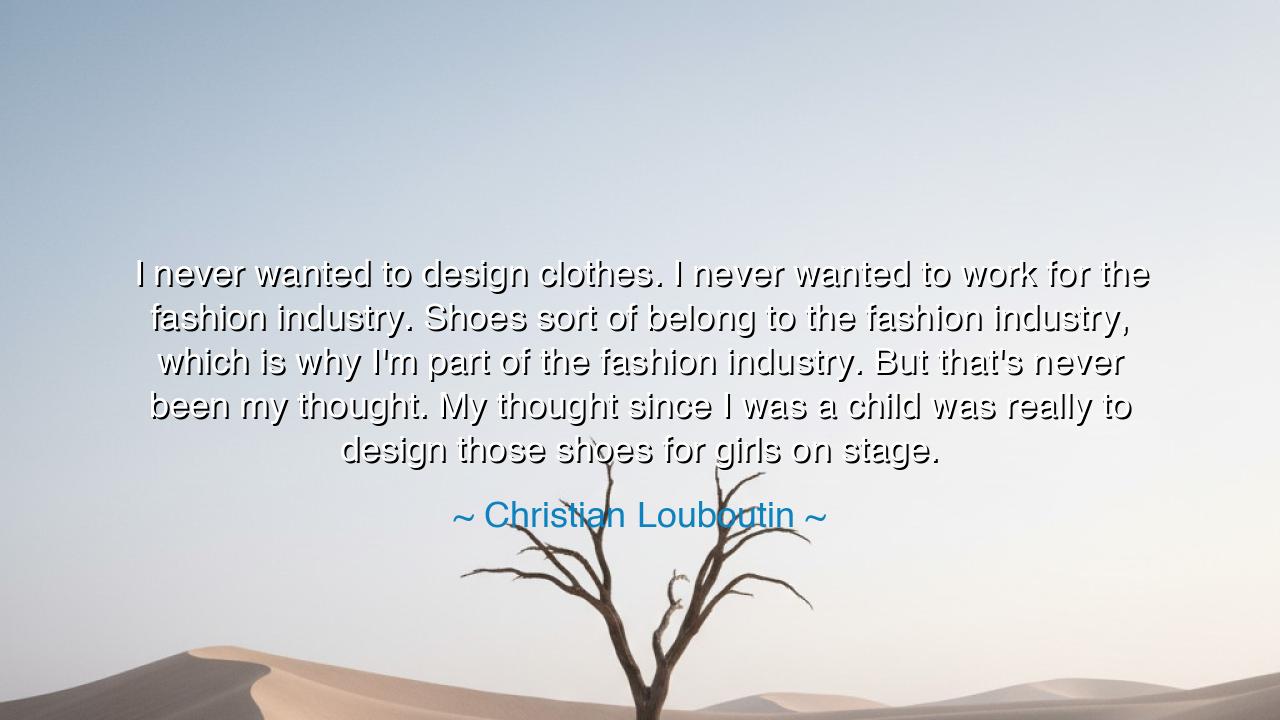
I never wanted to design clothes. I never wanted to work for the
I never wanted to design clothes. I never wanted to work for the fashion industry. Shoes sort of belong to the fashion industry, which is why I'm part of the fashion industry. But that's never been my thought. My thought since I was a child was really to design those shoes for girls on stage.






Hearken, O children of vision and craft, and attend to the words of Christian Louboutin, the master of the sole and the stage, who proclaimed: “I never wanted to design clothes. I never wanted to work for the fashion industry. Shoes sort of belong to the fashion industry, which is why I'm part of the fashion industry. But that's never been my thought. My thought since I was a child was really to design those shoes for girls on stage.” In these words lies a revelation of the soul’s true calling, a testimony that purpose is born not from circumstance or expectation, but from the quiet stirrings of childhood imagination and desire. Design for the stage becomes the altar upon which talent, devotion, and inspiration are offered.
Since the dawn of human creativity, mortals have dreamed beyond the confines of duty and inheritance. The artisans of ancient Egypt, carving statues and garments for ceremonies, understood that their hands served a higher vision than mere labor. Louboutin’s insistence that he was drawn to design shoes for performers reminds us that true genius follows the call of the heart, not the dictates of commerce or societal expectation. One’s life work, when aligned with genuine passion, becomes luminous and enduring.
Consider the story of Issey Miyake, the Japanese designer whose childhood fascination with clothing and movement led him to transform fabric into fluid sculpture. Though the fashion industry would claim him, his guiding thought was never to serve it—it was to honor the vision within him. Louboutin mirrors this journey: he did not aspire to join an industry, he aspired to create for the theater, for the enchantment, drama, and life of the stage. The industry found him, not the other way around.
The essence of Louboutin’s meditation is clarity of purpose. To follow one’s inner calling is to resist the seductive lure of external definitions of success. Shoes, for him, were more than objects; they were instruments of storytelling, power, and transformation. They embodied movement, poise, and the essence of the performer. By committing to this vision, Louboutin demonstrates that alignment with true intention produces work of enduring beauty and cultural resonance, far beyond what mere ambition might achieve.
In the theater, every element matters: light, sound, costume, and movement must harmonize to create magic. Louboutin understood this even as a child. The shoes were not merely adornment; they were tools of expression, allowing dancers and performers to embody the drama and spirit of their art. History teaches us that tools, when crafted with love and insight, elevate the human experience—consider Stradivarius violins, whose resonance amplifies the soul of music centuries beyond their creation.
O seeker, take this teaching into your own life: pursue your passions with unwavering attention to your inner vision. Do not be swayed solely by external rewards, acclaim, or status. Let your childhood dreams and deepest inclinations guide your work, for therein lies authenticity, innovation, and the potential to touch the hearts of many. A life forged from genuine purpose resonates far more deeply than one forged from obligation or expectation.
Moreover, understand that industries, systems, and frameworks are vessels, not masters. Louboutin’s insistence that he became part of the fashion industry because of shoes, not for their sake, teaches that the world will often recognize and embrace true genius, even if it does not fit its prescribed definitions. Align your craft with your calling, and let the world respond, rather than seeking validation before creation.
Thus, Christian Louboutin’s words endure as a beacon for all generations: follow your vision, honor your passions, and let purpose, not expectation, define your work. Whether designing shoes for the stage, composing music, or shaping words and ideas, the soul that listens to its inner calling will create with authenticity, inspire through excellence, and leave a legacy of beauty and wonder that transcends the ordinary paths of life.
If you wish, I can also craft a short illustrative story showing a young person discovering their true calling despite external pressures, making Louboutin’s philosophy vivid for listeners. Would you like me to do that?






AAdministratorAdministrator
Welcome, honored guests. Please leave a comment, we will respond soon